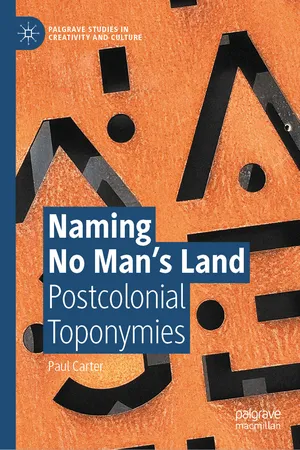
- English
- ePUB (mobile friendly)
- Available on iOS & Android
About this book
This book is a practice-based exploration of the politics and poetics of replacing colonial placenames with Indigenous ones. From a horizon of case-studies in Western Australia, the study develops a lively dialogue with international critical toponymy theory and with older etymological approaches to place renaming and legitimation. The author shows how renaming raises fundamental questions of meaning, reference and cross-cultural equivalence.
Recognising the 'sense of place' values that accrue to placenames, Carter argues that placenames have a creative as well as discursive function: they are talking points that bring places into being. For this reason, to decolonize toponymy involves a postcolonial poetics. Naming No Man's Land argues for a practical, community-shaped toponymic poetics that escapes from the binarist logic of imposition/erasure, showing that, when the principle that 'places are made after their stories' is followed, new creative mechanisms of co-existence can emerge. A must read for anyone engaged in postcolonial studies, creativity studies, cultural geography, sociolinguistics, historical ethnography, eco-criticism, environmental humanities, (Australian) Aboriginal studies, and related disciplines.
Frequently asked questions
- Essential is ideal for learners and professionals who enjoy exploring a wide range of subjects. Access the Essential Library with 800,000+ trusted titles and best-sellers across business, personal growth, and the humanities. Includes unlimited reading time and Standard Read Aloud voice.
- Complete: Perfect for advanced learners and researchers needing full, unrestricted access. Unlock 1.4M+ books across hundreds of subjects, including academic and specialized titles. The Complete Plan also includes advanced features like Premium Read Aloud and Research Assistant.
Please note we cannot support devices running on iOS 13 and Android 7 or earlier. Learn more about using the app.
Information
Table of contents
- Cover
- Front Matter
- 1. Introduction: Practising Toponymic Decolonisation
- 2. Relating Country: Some Recent Noongar Place Naming Projects
- 3. Proper Names: Differences Between Aboriginal and Colonial Toponymy
- 4. Naming and Renaming Places: Politics, Poetics and Psychology
- 5. Decolonising No Man’s Land: Writing Back Against the Map
- 6. Making Place: Yarning and the Protocols of Poetic Geography
- 7. Anticipating Arrival: Migrancy and Creative Toponymy
- 8. Conclusion: Right Ways of Meeting, Their Naming and Mapping
- Back Matter